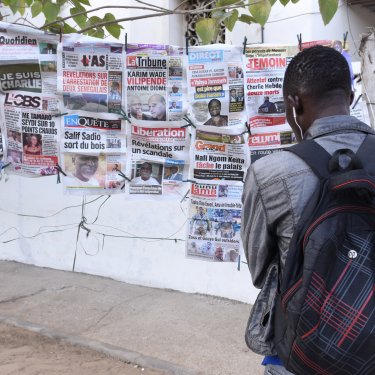In Senegal, three journalists convicted of libel for reporting undisputed fact

Reporters Without Borders (RSF) is stunned to learn that a Dakar court has convicted three journalists of defamation for reporting an established fact, one that nobody disputes.
The three journalists – El Hadji Alioune Badara Fall, editor of the daily L’Observateur, Alassane Hanne, one of his reporters, and Vieux Père Ndiaye of the daily Grand Place – were given suspended sentences of two months in prison and were fined 10 million CFA francs (15,000 euros) on 21 April. The case was brought against them because they reported in January that Seydina Alioune Seck, the son of well-known musician Thione Seck, had been charged with “criminal association” in a police investigation into trafficking in forged banknotes. The judge found them guilty of defamation although, during the hearing, the prosecutor himself produced evidence of the fact that this charge was brought against Seck.
“This decision is unprecedented in Senegal and is designed to suppress freedom of information."Mr. Baboucar Cissé
“We dispute this ruling and we are going to appeal,” said their lawyer, Baboucar Cissé. “This decision is unprecedented in Senegal and is designed to suppress freedom of information. The newspaper reports were informative and did not prejudice Mr. Seck, who was charged, arrested and then freed on bail pending the outcome of the investigation.” In Senegal, the intelligences services and police routinely provide journalists with copies of the official reports of judicial hearings. This is forbidden under Senegalese law but no journalist has ever been prosecuted for using such a document as the basis for reporting the existence of a judicial case. The judge who found against the three journalists did not read out his entire verdict in court and has not provided their lawyer with a copy.
 El Hadji Alioune Badara Fall
El Hadji Alioune Badara Fall“Is the use of a police report for a newspaper story the issue here and, if so, why did the judge not convict them on that charge instead of defamation?” said Constance Desloire of RSF’s Africa desk. “The judicial inconsistencies in this case are fuelling concern about an offensive against the right to information, especially as a draft press law has been shelved for several years in parliament. This case has yet again demonstrated the urgency of the need to decriminalize media offences.”
The past few months have seen several attacks on freedom of information, in which Radio Walfdjri, a privately-owned independent radio station, has been a repeated target. In February, the Criminal Investigation Department demanding the recordings of a broadcast in which an activist criticized President Macky Sall. In March, the Telecommunications Regulatory Agency tried to disconnect the station’s signal but was thwarted by the crowd of listeners that gathered outside.
Senegal is ranked 65th out of 180 countries in RSF’s 2016 World Press Freedom Index.



